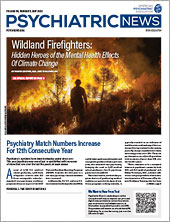Is rural mental health the future of psychiatry? That question may strike some as odd, since mental health care in rural areas is often described as lacking. But I believe the whole of psychiatry can look to rural mental health care for lessons to the future.
Rural psychiatrists have been utilizing telepsychiatry for decades prior to the pandemic, leading almost every provider to become acquainted with this technology. And rural practitioners know better than anyone that there will never be enough psychiatrists to meet the needs of all those who need help in this country. As a consequence, the psychiatrists who serve in rural communities, either directly or remotely, have come to rely on a vast array of other mental health professionals.
Primary care practitioners—whether they are physicians or nurse practitioners—as well as psychologists, social workers, community health workers, first responders, peers, and other community activists often work closely with each other in rural communities. Multiprofessional and integrated care has been the standard in rural mental health for a long time. At the University of Virginia, we have been successfully working with primary care clinicians, peer counseling organizations, and community hospitals for two decades, promoting collaborative and integrated care through telepsychiatry.
Practitioners in rural areas of the country and psychiatrists interested in rural psychiatry are invited to join the Caucus of Rural Psychiatrists by going to the
Join a Caucus page on the APA website.
Project ECHO is a knowledge-sharing model that brings together specialists from multiple focus areas for a robust, holistic approach to health and mental health. Since the first use of ECHO by the University of New Mexico in 2003 to combat hepatitis, rural communities have been the focus of this technology. At the University of Virginia, we have found that ECHO sessions focusing on mental health and substance use diagnosis and treatment, along with e-consults from community practitioners and other mental health facilitators, augment the use of telepsychiatry by local rural practitioners. The combination of these elements greatly enhances the effectiveness of primary care physicians in caring for their patients.
Although rural psychiatrists did not coin the term “structural competency,” rural psychiatrists have by necessity had to understand and confront the structural determinants of mental health in their communities—poverty, racism, stigma, and more. This has required rural practitioners to know the strengths and weaknesses of their communities and to act within communities, not just in the office.
Though not perhaps as diverse as urban populations, rural communities are far from homogenous. Working in that environment calls for sensitivity to the various cultural worlds found in these communities. And rural regions differ from each other. The mountainous rural communities of the far West are quite different from those of the Midwest or New England. The far Northwest and Alaskan communities are equally different and diverse. The Ozark communities may share more with Appalachia than with the rural areas of neighboring Kansas and Oklahoma. The rural Mississippi Delta is a strong contrast to the greater Southwest. Each of these have unique cultural communities, whether Native American, Hispanic, Cajan, Scotch Irish, or French Canadians in Maine. Consequently, rural practitioners have had to be culturally sensitive and knowledgeable, and mental health work has had to be community based.
Teaming with anthropologists, social scientists, and historians with local knowledge and those with lived experience is key to appreciating and respecting local ways of knowledge. We have collaborated in studies addressing local knowledge and interpersonal dimensions of depression, “bad nerves,” and opioid drug use. We have also recognized for a long time that interventions or research need to be sanctioned and supported by the local community; otherwise, it will not succeed. For example, the Division of Outreach in the Department of Psychiatry and Neurobehavioral Sciences at the University of Virginia received a grant from the commonwealth’s Tobacco Indemnification and Community Revitalization Fund to establish a medication-assisted treatment program in partnership with a free clinic, the Health Wagon in rural Wise, Va., that would offer not only drug treatment, but also psychiatric care and general primary care over four years. The first three and a half years were used to bring community stakeholders and concerned citizens on-board in the face of strong community opposition to such a program. In the end, it was very successful but would not have happened without persistent effort to address community concerns and build alliances.
While rural areas may all share the challenges of low capacity and problems with affordability, access, and acceptability, they represent an area of innovation and creativity from which psychiatry as a whole can benefit. Through various alliances between university departments, local providers, community activists, and peer organizations, rural mental health efforts are paving the way for psychiatry as a profession to deal with the many challenges that face mental health care throughout the nation. ■
Practitioners in rural areas of the country and psychiatrists interested in rural psychiatry can join the Caucus of Rural Psychiatrists by going to the
Join a Caucus page on the APA website.

